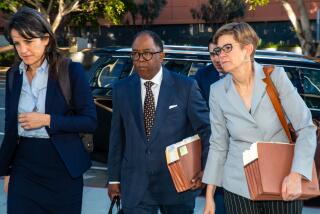Effect of Hill’s ‘Passing’ of Lie Test Uncertain
- Share via
WASHINGTON — Even as supporters of Anita Faye Hill announced Sunday that she had taken and passed a lie detector test, critics and some experts were quick to point out that while the polygraph is considered a valuable tool by investigative agencies its accuracy can vary widely.
And lie detector tests are not admissible as evidence in federal courts or in many state proceedings.
Nevertheless, according to legal experts following the Senate Judiciary Committee hearings for Supreme Court nominee Clarence Thomas, the test that Hill took and apparently passed on Sunday may prove to be a significant problem for Thomas and his supporters as they attempt to rebut her allegations of sexual harassment.
Since the charges essentially come down to Thomas’ word against Hill’s, with no direct evidence brought forward thus far to resolve the conflict, the issue of her credibility has become paramount.
“It (the lie detector test) may not be admissible in a court of law, but it is certainly going to weigh heavily on the minds of a lot of senators,” said Sen. Patrick J. Leahy (D-Vt.), a committee member.
President Bush said earlier in the day that it would be “a stupid idea” for both Thomas and Hill to take lie detector tests to help determine which one was telling the truth about the sexual harassment that Hill alleges Thomas inflicted on her when she served as his aide at the Education Department and the Equal Employment Opportunity Commission in the 1980s.
“If the idea is challenging the word of one over another, to use the lie detector test in that way, I reject it,” Bush said.
Although Leahy called the test results a “very significant development,” several polygraph experts noted that the accuracy of the test depends on the expertise of the person administering it. And two polygraph experts challenged the competency of the examiner who heads the company that tested Hill.
Paul K. Minor, a private security consultant who for many years ran the polygraph division at the FBI, administered the test at the request of Hill’s attorneys. He asked the University of Oklahoma law professor if she had fabricated her allegations that Thomas sexually harassed her by repeatedly asking her for dates and by discussing his sexual prowess with her in explicit and often vulgar terms.
“She answered no. There was no indication of deception to any of the relevant questions,” Minor told reporters outside the hearing room where the committee was meeting. “It is therefore my opinion Ms. Hill is truthful.”
While he is considered to be a prominent expert in his field, Minor’s reputation is not without controversy.
In July of 1980, Minor, who was then with the FBI, administered two polygraph tests to Herman Sillas, then the U.S. attorney in Sacramento, to determine the veracity of allegations that he had taken a $7,500 bribe from a prison inmate several years earlier. Sillas resigned after failing both polygraph tests.
At the request of his attorneys, the results were later examined by other experts who concluded that the tests had been improperly administered and the results “seriously flawed,” according to Dr. Chris Gugas, chairman of the National Polygraph Assn.
Another expert, Lynn Marcy, who was then president of the American Polygraph Assn., was called in to administer the test for a third time and the results of that test indicated that Sillas was telling the truth.
“We filed complaints against Minor with the FBI and asked the American Polygraph Assn. to investigate him,” said Richard Hickman, a San Francisco-based polygraph expert who along with Gugas reviewed the results of Minor’s test.
Hickman said that the way in which Minor phrased the questions he put to Sillas, along with what he remembers as being “serious” shortcomings in the methodology Minor used, raised troubling questions about his competence at the time.
A spokesman for the FBI, however, said that Minor had retired from the bureau in the mid-1980s with his record there unblemished.
Minor could not be reached for comment Sunday. A man answering the telephone at his Northern Virginia residence said he left Washington immediately after announcing the results of Hill’s test and was en route to New York City.
More to Read
Get the L.A. Times Politics newsletter
Deeply reported insights into legislation, politics and policy from Sacramento, Washington and beyond. In your inbox twice per week.
You may occasionally receive promotional content from the Los Angeles Times.










